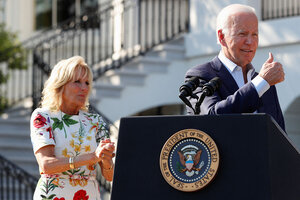‘Resurgent, radical’ center faces political head winds worldwide

U.S. President Joe Biden delivers remarks on the South Lawn of the White House, July 4, 2022. He made promises in 2020 for bipartisanship but is under pressure from both Republicans and Democrats.
Tom Brenner/Reuters
London
It was hard to escape the impression of an aging rock star returning for one last gig – appropriate, in a way, since the headline act, former British Prime Minister Tony Blair, was something of a wannabe guitarist in his youth.
But the conference Mr. Blair convened in London last week was about politics, not pop music.
Once the poster boy for “third way” politics, steering between the extremes, he is arguing that there is a renewed need for those in the center ground of politics to claw back voter affection from populists and ideologues on both left and right.
Why We Wrote This
Pragmatic cooperation is currently out of political fashion even in the oldest of democracies; but without it, governments will struggle to address the key challenges of our time.
His message is rooted in a mix of political values – notably cooperation and compromise – and a hard-nosed acceptance of the policy spadework it will take to put those values into practice.
And it’s a message relevant to the future of democratic governance in Britain and beyond: most urgently in the United States, but also in European countries and in America’s major Middle East ally, Israel.
In all of these places, gladiatorial partisan politics are corroding democracies at a time when the issues governments are facing are too complex, and too politically fraught, to be resolved by any one side’s slogans, rhetorical flourishes, or easy promises. That will require developing and implementing new, forward-looking policies equal to those challenges.
Will that happen? The current political climate suggests it’s a long shot.
But the struggle is underway, and it is reaching a decisive point in a number of democracies – perhaps nowhere as dramatically as in the United States.
President Joe Biden took office determined to achieve what Mr. Blair is urging, after four years of ideologically charged rule by Donald Trump which had magnified America’s divisions.
Mr. Biden vowed a bipartisan effort to tackle big issues affecting the lives of all Americans: rebounding from the pandemic, fixing a creaking national infrastructure, tackling climate change by building a greener economy, addressing inequalities in employment, health, and social care.
Yet he’s been stymied. He’s under pressure from both sides: from a Republican party still dominated by Mr. Trump, and from Democratic politicians on the left who dismiss his efforts at coalition-building as weak and naive.
In Europe, Mr. Blair’s bid for what he calls a “resurgent, radical” center also faces headwinds.
Not because of problems building coalitions, which is far less controversial in European countries than in hyperpartisan America.
The tougher task will be agreeing to a detailed policy vision to avert the long-term threats to a stable and sustainable future.
French President Emmanuel Macron, for example, will likely find immediate political imperatives getting in the way of that. A centrist, he won reelection earlier this year, but he no longer has an absolute majority in parliament, which means his government will have to rely on left-wing and right-wing foes, on a law-by-law basis, to get legislation passed.
In Britain, with Conservative leader Boris Johnson finally resigning and reduced to caretaker status until his disgruntled party chooses a successor in the fall, the leader of the Labour Party, Keir Starmer, shares Mr. Blair’s view that he is still going to need to attract disenchanted Conservatives if Labour is to win the next election.
But his immediate priority has been to restore his party’s credibility. He has had no time to work on the kind of policy agenda Mr. Blair envisages: building a new relationship with Europe in the wake of Brexit; investing in nuclear-power stations and other measures to build a green economy; expanding the use of technology and AI to modernize an overstretched national health service.
Still, the most telling test of whether a centrist rebound is realistic may be Israel.
There, in a break from years of angry stalemate under Trump-allied Prime Minister Benjamin Netanyahu, a new ruling coalition took power a year ago.
Its chief architect was center-left leader Yair Lapid. But he included a smaller, far-right party, and agreed that its leader, Naftali Bennett, would be prime minister for the first two years. And for the first time in Israel’s history, it included a party representing Arab Israelis, who make up some 20% of the country’s population.
The government’s first achievement was to survive Mr. Netanyahu’s attacks as a haven for “terrorists.” But it also passed a state budget for the first time in several years. It began addressing underinvestment in Israel’s Arab communities. And it demonstrated that Israelis of very different backgrounds and ideologies could work together in common cause.
But it has now lost its wafer thin parliamentary majority. Mr. Lapid has replaced Mr. Bennett as caretaker prime minister and called new elections for November.
Mr. Netanyahu is set on winning back power, and polls suggest he may well succeed. Mr. Lapid’s hope will be to convince voters that the compromise and cooperation his coalition embodied were much more than just an improvement on familiar zero-sum political bickering.
In fact, Mr. Lapid needs to make it clear, they are nothing less than essential to addressing the long-term challenges that his and other democracies face.

